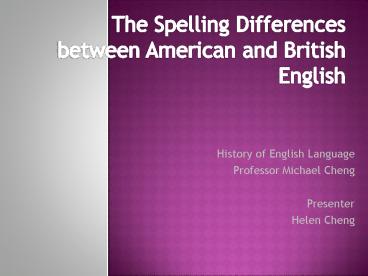The Spelling Differences between American and British English - PowerPoint PPT Presentation
1 / 11
Title:
The Spelling Differences between American and British English
Description:
History of English Language Professor Michael Cheng Presenter Helen Cheng English spelling was standardized after the publishing of influential dictionaries British ... – PowerPoint PPT presentation
Number of Views:505
Avg rating:3.0/5.0
Title: The Spelling Differences between American and British English
1
The Spelling Differences between American and
British English
- History of English Language
- Professor Michael Cheng
- Presenter
- Helen Cheng
2
Historical Origins
- English spelling was standardized after the
publishing of influential dictionaries - British-Samuel Johnsons A Dictionary of the
English Language (1755) - American- Noah Websters American Dictionary of
the English Language (1828)
3
Samuel Johnson
- A Dictionary of the English Language
- aks. Johnson's Dictionary (1755)
- The pre-eminent English dictionary before the OED
- one of the greatest single achievements of
scholarship - Deduce to the origin
- Illustrate with literary quotations
- Provide Multiple definitions
- With illustrations
4
Noah Webster
- A Compendious Dictionary of the English Language
(1806) - Introducing American spelling and words
- American Dictionary of the English Language
(1828) - Expanding to 70,000 entries
- Spelling reform
5
Spelling Reform
- based on the Websters combined vision of logic
and aesthetics - principle of uniformity words that were alike,
nouns and their derivatives, should be spelled
alike. (e.g. musickgtmusic (musical)) - respell anomalous British spellings (e.g.
gaol/jail)
6
Common Spelling Differences between BrE and AmE
- Greek Spelling -our/-or -se/-ce -re/-er
- Latin-derived Spelling -ise/-ize -yse/-yze
-ogue/-og - Doubled Consonants -ll
- Dropped e
7
Greek Spelling-ise/-ize
- British usage both ise(more frequent) and ize
(Oxford spelling) - e.g. organise, realise, and recognise
- American usage ize
- e.g. organize, realize, and recognize
- Originated from Greek -??e??, Latin -izare with
the pronunciation /z/ - -ise was influenced by the special French
spelling in -iser
8
Latin-derived Spellingunstressed our/-or
- Nowadaysgt -our for British English and -or for
American English - e.g. colour/color, labour/labor, and
flavour/flavor - Derived from Latin non-agent nouns having
nominative or - Borrowed into English from early Old French
ending -or or -ur - After the Norman Conquest gt-our in Anglo-French
in an attempt to represent the Old French
pronunciation - After the Renaissance, some such borrowings from
Latin gtoriginal -or - In16th and early 17th century some British
scholars gt - -or for words from Latin and -our for French
loans
9
Doubled Consonants
- General rule when adding a suffix beginning with
a vowel to words with final stressed syllable and
ending with a single vowel followed by a single
consonant - The British English l doubling is required for
all inflections (-ed, -ing, -er, -est) and noun
suffixes -er and or - e.g. counsellor, cruellest, modelling,
quarrelled, signalling, traveller, and travelling - In American usage, the spelling of words is
unchanged when they form the main part (root) of
other words - e.g. wil(l)ful, skil(l)ful, thral(l)dom,
fulfil(l), fulfil(l)ment, enrol(l)ment
10
Dropped e
- British English usually keep silent e when
adding suffixes except it is unnecessary to
indicate pronunciation (e.g. believable,bluish) - American English usually eliminate silent e
except for some ambiguous cases (e.g. diegtdying
vs. dyegtdyeing) - e.g. likeable/likable, ageing/aging, arguement/
argument
11
Conclusion
- Language serves as an indicator of cultural and
social differences - Language is changing with time and space
- The variants of a single language makes it
diverse































